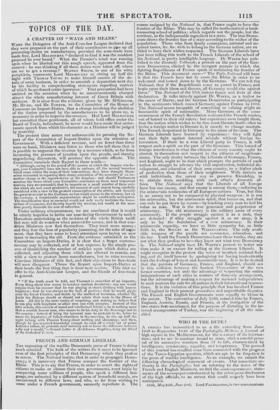TOPICS OF THE DAY.
A CHAPTER ON " WAYS AND MEANS."
WHEN the Delegates of the Anti-Corn-law League declared that they were prepared on the part of their constituents to giive up all protecting-duties on manufactures, provided the corn-trade were made free, Lord MELBOURNE " declared to God it was the maddest proposal he ever heard." What the Premier's mind was running upon when he blurted out this rough speech, appeared from the context : he was thinking if all these duties were taken off; where are we to get a revenue ? SYDNEY SMITH, in one of his witty pamphlets, represents Lord MELBOURNE as sitting up half the night with Menem YouNG to make himself master of the de- tails of some business, in order to astonish a deputation next day by his flicility in comprehending statements regarding matters of which he professed entire ignorance."' That precaution had been omitted on the occasion when he so unceremoniously charged almost the whole manufacturing interest of Great Britain with madness. It is clear from the evidence given by Mr. M'Gmmoa, Mr. HemE, and Mr. PORTER, to the Committee of the House of Commons on Import-Duties, that a change involving the abolition of the duties proposed by the manufacturers to be given up, is necessary in order to improve the revenue. hind Lord MELBOURNE but consulted these gentlemen, all of whom hold office under the Board orfrade, beforehand, he never would have made that unfor- tunate speech from which his character as a Minister will be judged
by posterity. The present time seems not unfavourable for pressing the Re- port of the Committee of Import-Duties upon the attention of Government. With a deficient revenue, and no fewer than three wars on hand, Ministers may listen to those who tell them that it is possible to augment the revenue by a measure which, so far from increasing the pressure of taxation upon the people, and thereby engendering discontent, will produce the opposite effects. The Committee conclude their Report in these words-
" Although, owing to the period of the session at which the inquiry was be- gun, your Committee have not been able to embrace all the several branches which come within the scope of their instructions, they have thought them- selves warranted in reporting their strong conviction of the necessity of au im- mediate change in the import-duties gt• the hingdom : and should Parliament sanction the views which your Committee entertains on these most important matters, they are persuaded, that by imposts on a small number of these arti:. des which are now most productive, the amount of each impost being carefully considered with a view to the greatest consumption of the article, and thereby the greatest receipt to the Customs, no loss would accrue to the revenue, but on the contrary, a considerable augmentation might be confidently anticipated. The simplification they re:Timmend would not only vastly facilitate the trans- actions of commerce, and thereby benefit the revenue, but would at the same time greatly diminish the cost of collection."
Under ordinary circumstances, we arc convinced that it would be utterly hopeless to invite our ease-loving Government to such a Herculean undertaking as the revision of the whole British tariff. But man will do wonders when pressed for money, and in that con- dition Ministers now find themselves. They want more money ; and they fear the loss of popularity (assuming, for the sake of argu- ment, that they have some to lose) attendant upon laying on new taxes or increasing the old. From the evidence submitted to the Committee on Import-Duties, it is clear that a larger customs- revenue may be collected, and at less expense, by the simple pro- cess of diminishing the number of articles upon which duties are collected, and adjusting those which are allowed to remain, not with a view to protect home manufactures, but to raise revenue. Convince Ministers of this fact, and their objections to free-trade will soon disappear. Throw the Report upon Import-Duties at their heads the first thing that is done-next session. This hint we offer to the Anti-Corn-law League, and the friends of free-trade in general.
* "If the truth must be told, our Viscount is somewhat of an impostor. Every thing about him seems to betoken careless desolation : any one would suppose from his manner that he was playing at cluck-birthing with human happiness; that he was always on the heel of pastime ; that lie would giggle away the Great Charter, and decide by the method of teetotum, whether My Lords the Bishops should or should not retain their seats in the House of Lords. All this is the mere vanity of surprising, and making us believe that he can play with kingdoms as other men can with ninepins. Instead of this lofty nebulo, this miracle of moral and intellectual felieitLs, lie is nothing more than a sensible honest man, who means to do his duty to the Sovereign and to the country : instead of being the ignorant man he eretends to be, before lie meets the deputation of tallow-chandlers in the morning, he sits up half the night talking with Thomas Young about melting and skimming; and then, though he has acquired knowledge enough to work off a whole vat of prime Leicester tallow, he pretends next morning not to know the difference between A dip and a mould."—Second Letter to Archdeacon Singleton, being the Third of the Cathedral Letters.


























 Previous page
Previous page